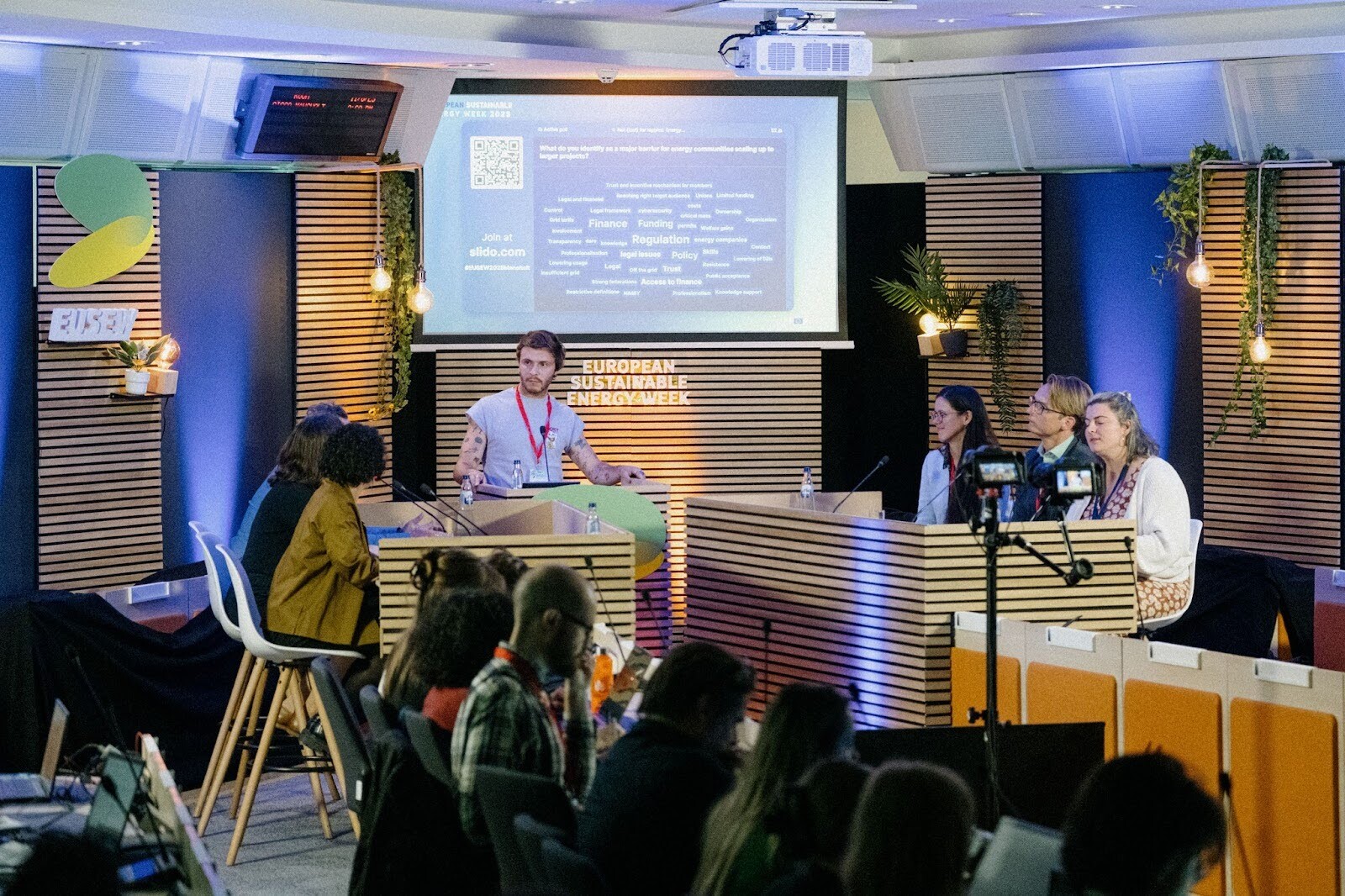News
High level policy workshop on financing energy communities

On the 11th of June in Brussels, during the European Sustainable Energy Week, REScoop.eu organised a high level policy event, as part of the LIFE ACCE project. Titled “Not (just) for hippies: energy communities can be the drivers of the EU’s re-industrialisation” the event showcased how energy communities can deliver on the Citizen Energy Package and the Clean Industrial Deal, analysing the barriers and opportunities they face in initiating large-scale projects such as offshore wind or district heating.
Overall, the event was attended by 307 people (204 online and 103 on-site), with a diverse range of policymakers, energy communities, financiers, and NGOs present. The diversity of attendees enhanced the richness of the discussions, providing a platform for collaborative idea generation and policy weaving.
Keynote and presentations
The event opened with a keynote by Vera Kissler (policy officer at DG ENER) who outlined the linkages between the Citizen Energy Package and the Clean Industrial Deal, emphasizing for example the role of energy communities in the Action Plan for Affordable Energy Prices. She highlighted the role of federations in helping with technical assistance and financial literacy, thus growing the community energy movement at the national level.
The floor was then passed to Philippe Awouters, Director of the secondary cooperative Seacoop, which has bid for a 10% share in the Princess Elizabeth offshore wind concession in Belgium. Philippe discussed the enabling conditions for energy communities to scale at such high levels, including: 1) the importance of networking and federations of energy communities, 2) the importance of mobilising the private financing sector, including with dedicated collaborations with banks, 3) the importance of co-development with private industrial RES actors, and 4) the role that national and EU institutions can play in leveraging additional private capital (e.g., the European Investment Bank).
Suzanne Renard, head of the investment team at Energie Partagee, the national federation of energy communities in France and one of the lighthouse examples of the ACCE project, was next to present. She emphasized the importance of: 1) federations and their regional networks. Energie Partagee has regional nodes composed of technical experts that provide crucial assistance to emerging energy communities by helping them with technical assistance, financial literacy, and awareness raising regarding available business models. Interestingly, four French Regions are leveraging the European Regional Development Fund to structurally support the work of these regional nodes of Energie Partagee. 2) Suzanne also highlighted the importance of co-development and co-ownership of projects between community energy actors and private renewable energy industry actors. Showcasing concrete examples from France, she showcased how community energy groups can help co-create large scale projects, such as wind and solar. To facilitate scaling, Suzanne also emphasized the importance of the french national Community Energy Financing Scheme (Energie Partagée Investisement), which has mobilised over 100 million euros in citizen energy investments.

Panel discussion and reflections
The session then continued with a panel conversation including Sandy Fameliari, project manager at Electra Energy, Seda Orhan, head of renewables at Climate Action Network, and Vera Kissler. Seda discussed CAN EU’s new flagship report on co-development and fair benefit sharing for renewable energy projects. Sandy highlighted the role of the LIFE COMET project which is currently building coalitions for community energy in several central and eastern European countries. In turn, she emphasized that these coalitions can eventually mature enough to create CEFS at the national level, further leveraging private capital and building on the LIFE ACCE findings, for these additional countries. Vera took stock of the conversation, acknowledging the importance of national coalitions.
Speakers broadly emphasized the importance of supportive legal and regulatory frameworks at the national level, so that energy communities can thrive. This is the baseline for project pipelines and bundling to occur, including through a CEFS, and thus offer attractive financing offers to private investors. They also emphasized the importance of creating a high level policy objective for energy communities at the EU and national levels (e.g., X GW of community energy by 2030), which should be accompanied by a national strategy, and a financing gap & opportunity analysis.
Speakers thus made a direct connection with the Commission’s upcoming Citizen Energy Package (expected Q4 2025), calling for supportive measures to create CEFs at the national level.
Insights and forward looking
At the end of the session, we shared REScoop.eu's Vision for the next EU Budget. The paper focuses on two key elements that are needed for EU funds to help scale the community energy movement:
- Strengthen federations, and scale up One Stop Shops, so that funds are centralised at the national level in an easily accessible, single contact point, co-managed between community energy actors and national authorities
- Crowd-in private capital to the transition through financial instruments such as guarantees and loans, and also through co-development of projects with industrial RES developers, and the capitalisation of CEFS.
Wrap up
The event showed - with crystal-clear examples, community energy’s capability to scale and deliver industrial-scale projects, becoming a driver for re-industrialisation. These projects meet the priorities of climate, competitiveness, and resilience as emphasised by the Commission.
Looking forward, provisions on benefit sharing in the upcoming Citizen Energy Package could transform opportunities into realities for citizens. It is important to craft an engagement framework that avoids corporate capture and ensures fair benefit sharing.
Emerging norms of cooperation between energy communities and market players are crucial, with federations leading the shaping of these norms. Co-management is vital for these norms to be effective.
